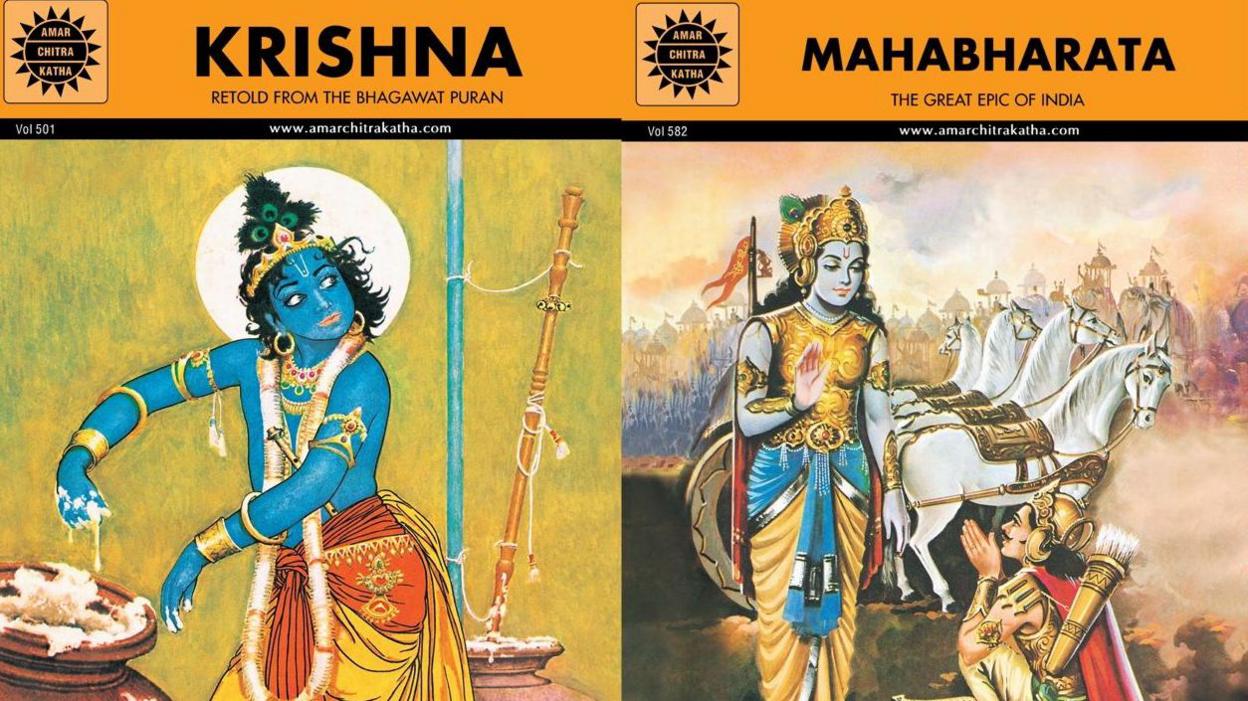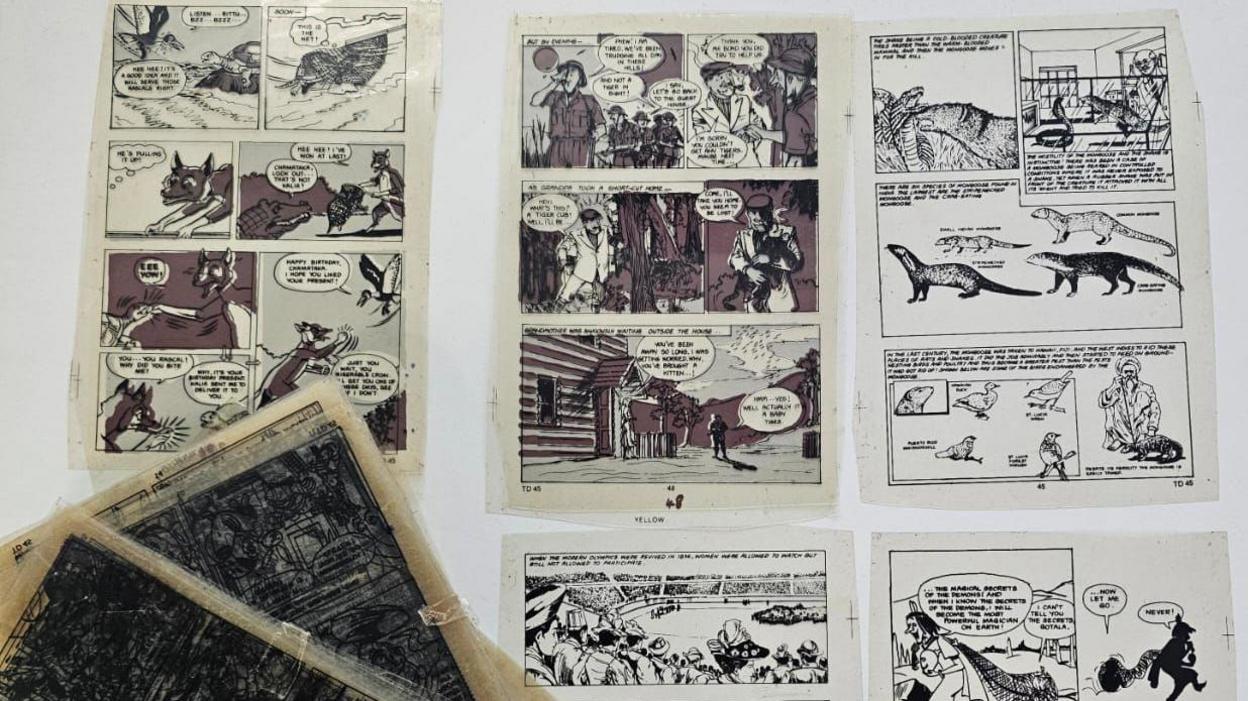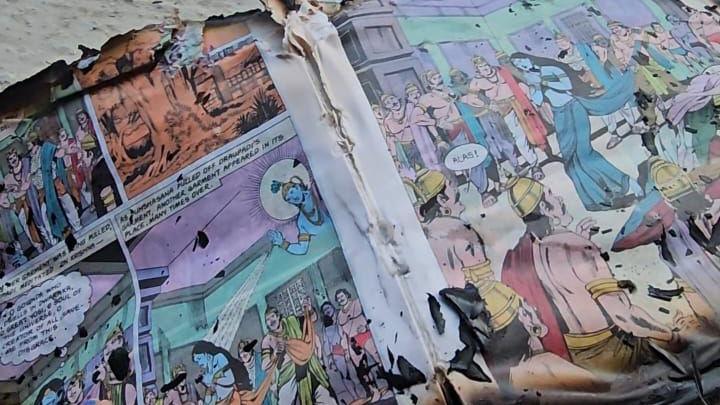Iconic Indian comic publisher loses precious drawings in fire

The issue on Krishna, in 1970, marked a turning point for Amar Chitra Katha
- Published
For generations of Indians, the Amar Chitra Katha comic books have been a gateway to stories on religion, mythology and history.
Amar Chitra Katha - which loosely translates as immortal illustrated stories - started publishing in 1967, using engaging visuals and simple language to retell religious parables, scriptures and folk tales in comic form.
Nearly six decades later, the comic remains popular, especially among children.
But part of that illustrated legacy has gone up in smoke. On 1 October, a massive fire broke out at the warehouse of Amar Chitra Katha in Bhiwandi, a suburb of Mumbai, reportedly caused by a short circuit.
It took firefighters four days to control the blaze. By then, the damage was done.
Nearly 600,000 books of Amar Chitra Katha and its sister publication Tinkle, a more light-hearted illustrated magazine for children, along with special edition box sets and merchandise, were destroyed, according to the publication's spokesperson.
The damaged material included more than 200 original hand-drawn illustrations from the 1960s and 1970s. The original positives on transparent film and other archival materials were also lost.
"Most of the positives have been preserved digitally, but the original hand-drawn artworks were stored in the warehouse. They were priceless. We never sold them, so we don't know the actual cost. They were preserved with great care," Damini Batham, Head of Marketing at Amar Chitra Katha and Tinkle, told BBC Marathi.
While the financial loss caused by the fire is yet to be ascertained, the emotional loss weighs heavy on comic book lovers in India.
"Even today, one can instantly recognise an Amar Chitra Katha image," says writer and comic book lover Ganesh Matkari.
"These books played a vital role in cultivating a love for reading among children. Their simple language and engaging visuals made complex stories accessible."

Amar Chitra Katha was started by Anant Pai
Amar Chitra Katha was started by Anant Pai, a junior engineer with The Times of India newspaper. He was associated with Indrajal Comics, owned by the newspaper group, which published comic books on American writer Lee Falk's popular heroes Phantom and Mandrake.
The idea for Amar Chitra Katha came to Mr Pai by chance when he was watching a quiz show at a shop that sold television sets in Delhi.
He noticed that the participants could answer questions on Greek mythology, but failed to answer questions on Indian epics and mythology.
Upset at what he saw, Mr Pai set out to create comic books based on Indian stories, according to his illustrated biography released by Amar Chitra Katha in 2012, a year after his death.
"The stories have a moral core and are used by parents and schools to teach Indian heritage worldwide," says Ms Batham.
The first ten issues featured Western fairy tales like Cinderella and Snow White. But it was the 11th issue on the Hindu deity Krishna, released in 1970, that marked a turning point for Amar Chitra Katha.
Illustrated by Ram Waeerkar, the Krishna issue set the tone for future publications.
Mr Waeerkar, known for his fine lines, expressive faces and dramatic compositions, went on to illustrate more than 90 comic books for the publication.
Following Krishna's success, Amar Chitra Katha expanded to include many more stories based on Indian mythological and historical characters such as Rama, Shakuntala, Savitri, Bheeshma, Hanuman, Chanakya, Buddha, Shivaji and Ashoka.
"These comics inspired me to become a cartoonist," renowned illustrator Alok Nirantar, who identifies as "a lifelong fan" of Amar Chitra Katha, told BBC Marathi.
"Everyone holds a soft corner for Amar Chitra Katha. Hearing about the loss of original documents is heartbreaking. Even in the digital age, the original artwork held unmatched value."

Amar Chitra Katha and Tinkle publish in several languages
In 1980, the publication launched Tinkle. The comic magazine was an insistent hit especially among children, with characters like Suppandi and Shikari Shambu becoming household names.
Amar Chitra Katha and Tinkle continue to be published in several languages including English, Hindi, Tamil, Malayalam and Bengali.
They sell around 4.5 million print copies a year, up from around 3 million around a decade ago, and the apps where their digital versions can be accessed have half a million users globally, an executive of the company told the BBC.
Gayatri Chandrasekharan, editor-in-chief of Tinkle, says, "October to February is our peak season. We were set to participate in several events including Diwali fairs, book festivals, and comic cons. Everything printed in the last six months was lost in the fire."
But Amar Chitra Katha's editor Reena Puri remains hopeful.
"We faced a similar fire in 1994. We rose from the ashes like a phoenix then, and we will do so again. The love of our readers and the determination of our team will help us rebuild," she says.
The 1994 fire, suspected to be caused by a short circuit in Mumbai's India Book House office, which published Amar Chitra Katha back then, damaged, external around 3,000 reference books and the artwork and scripts for several unreleased editions.
Ms Puri sees this as an opportunity to innovate through digital platforms. "Our library of over 1,500 books is now available digitally through apps," she adds.
Yet for art lovers, the loss is irreplaceable. Any exhibition of the original artworks is no longer a possibility.
"We rarely get to see original works by legends like Bal Thackeray [who eventually became a popular political figure] or RK Laxman," Mr Nirantar laments. "Now, with Amar Chitra Katha's originals gone, future generations may never see these masterpieces firsthand."
Follow BBC News India on Instagram, external, YouTube,, external Twitter, external and Facebook, external.